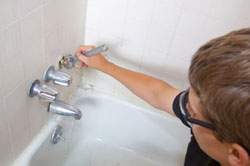The market for plumbing jobs in Ontario belongs exclusively to individuals who have obtained their plumbing certification. In the Ontario province, as well as in the rest of Canada, the license to practice is referred to as Certification of Qualification or C of Q, for short. The Canadian authorities have included these specifications in the Trades Qualification and Apprenticeship Act, which was passed back in 1981.
To summarize the highlights of this Act, a plumber who wants to practice in this profession, must be in possession of one of the following:
- Certificate of Qualification
- Apprenticeship certification
- Provisional certification
Training and education requirements in Ontario
An aspiring plumber in Ontario can obtain his training via the Ministry of Training, and more particularly, the branch providing workplace training. Alternatively, MCTU colleges and universities can provide the necessary education, but unlike the apprenticeship programs the student is not paid and must account for the tuition. The plumber who enters the work field as an apprentice must spend 5 years until he can reach the level of journeyman. This period includes roughly 9000 hours of work as well as 720 hours in post secondary schooling. To put it simply, 90% of the apprenticeship period is spent on performing hands-on practice and 10% comprises of theoretical coursework.
The alternative path to certification
The good news for immigrants that have already completed the training in a different country is that they are not required to go through the apprenticeship again. However, they are not automatically granted the certification, but rather they are allowed to take the test that would accredit them as licensed plumbers. For this purpose, the individual is required to present proof of his training, education and experience as well as agree to the terms and conditions of the Attestation of Competencies document. During this period, applicants are awarded a temporary work permit referred to as Provisional C of Q.
The C of Q examination
It is necessary to point out that in addition to mathematical skills and intimate knowledge of the plumbing domain and all its aspects, the candidate is required to have a firm grasp of either the French or the English language. Proficiency in these languages is necessary in order to comprehend instructions, read blueprints, confirm specifications and interact with team members or customers. However, there is no specific language test, even though successfully passing the exam implies speaking and understanding them. The exception to this is that in certain cases the candidates are allowed to bring a translator along, on the assumption that the translator is not trained in the field of plumbing. In order to pass, the candidate must have a minimum score of 70 percent.
The market for plumbing jobs in Ontario
Statistics indicate that the vast majority of plumbing jobs in Ontario can be found in construction, meaning an overwhelming 70 percent. Therefore, the job demand relies heavily on the development of the infrastructure and the investments made by the government and companies from the private sector. In regards to the salary during the apprenticeship period, during the first year a plumber is expected to earn roughly forty percent of a journeyman’s paycheck, incrementing consistently until the last year of apprenticeship, when he earns around 80 percent.

- Home
- Jobs In Plumbing USA
- Plumbing Jobs Colorado
- Plumbing Jobs Denver
- Plumbing Jobs In Alaska
- Plumbing Jobs In Arkansas
- Plumbing Jobs In California
- Plumbing Jobs In Chicago
- Plumbing Jobs In Colorado
- Plumbing Jobs In Georgia
- Plumbing Jobs In Houston
- Plumbing Jobs In Idaho
- Plumbing Jobs In Illinois
- Plumbing Jobs In Los Angeles
- Plumbing Jobs In MA
- Plumbing Jobs In Maine
- Plumbing Jobs In Maryland
- Plumbing Jobs In Massachusetts
- Plumbing Jobs In Michigan
- Plumbing Jobs In Minnesota
- Plumbing Jobs In North Carolina
- Plumbing Jobs In NYC
- Plumbing Jobs In Ontario
- Plumbing Jobs In San Diego
- Plumbing Jobs In Texas
- Plumbing Jobs In Utah
- Plumbing Jobs In Virginia
- Plumbing Jobs Indiana
- Plumbing Jobs San Diego
- Plumbing Jobs Wisconsin
- Jobs In Plumbing Information
- Types Of Jobs In Plumbing
